Munchkin cats may be small and short-legged, but their care needs are as big as their personalities. Their unique build, playful energy, and affectionate nature make them delightful companions, yet they are prone to challenges like joint strain, obesity, and mobility issues if preventive care is overlooked. Timely vaccines, preventive care and regular grooming for Munchkin Cats are non-negotiable.
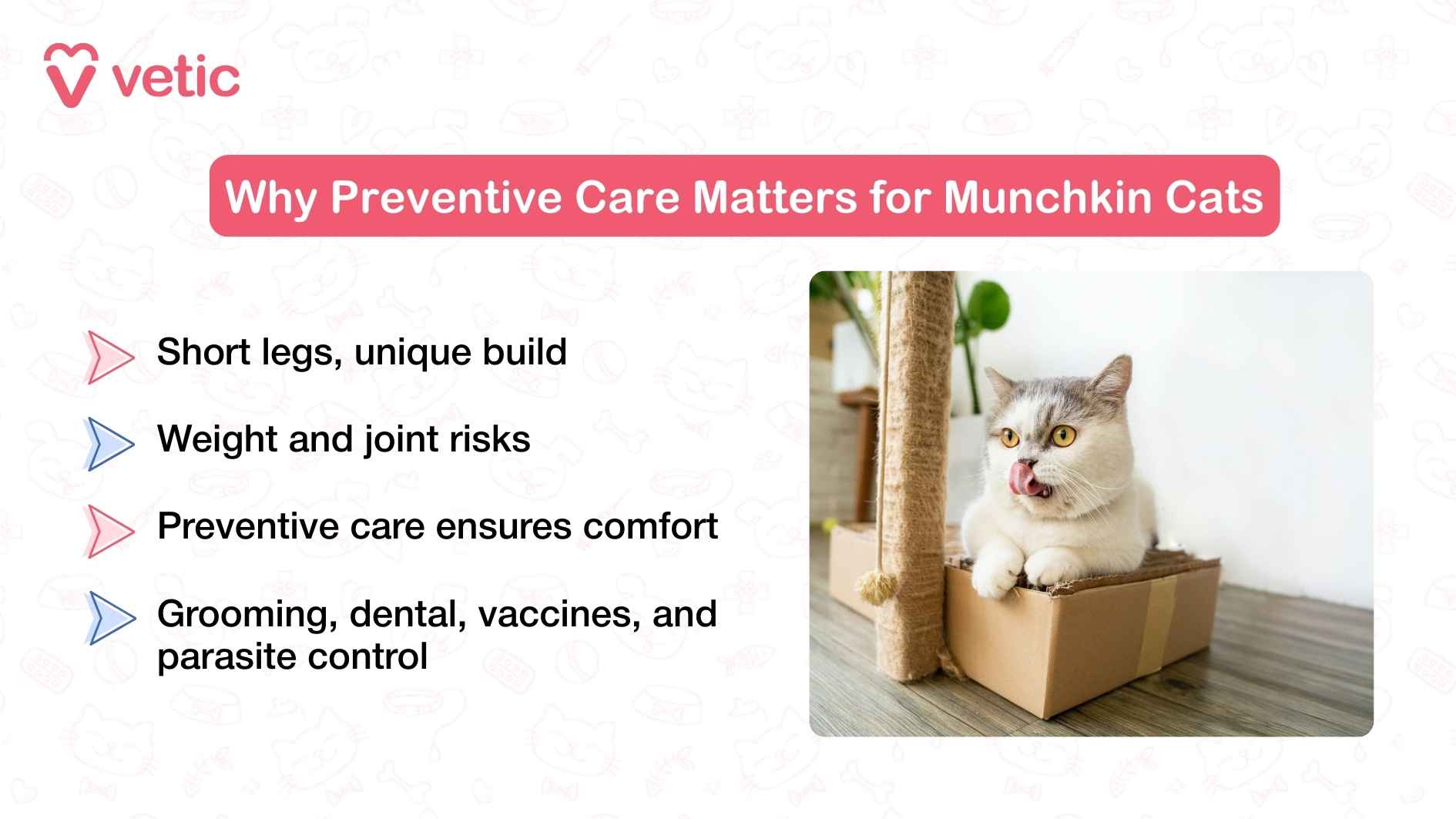
Preventive care, from vaccinations and parasite control to grooming, nutrition, spaying or neutering, and weight management, is the foundation of a healthy, happy life for your Munchkin. While the basics remain consistent throughout life, the intensity and focus areas change as they grow. Let’s explore how preventive care evolves from kittenhood to the senior years.
Vaccination, Deworming and Grooming for Munchkin Kittens (0–12 Months)
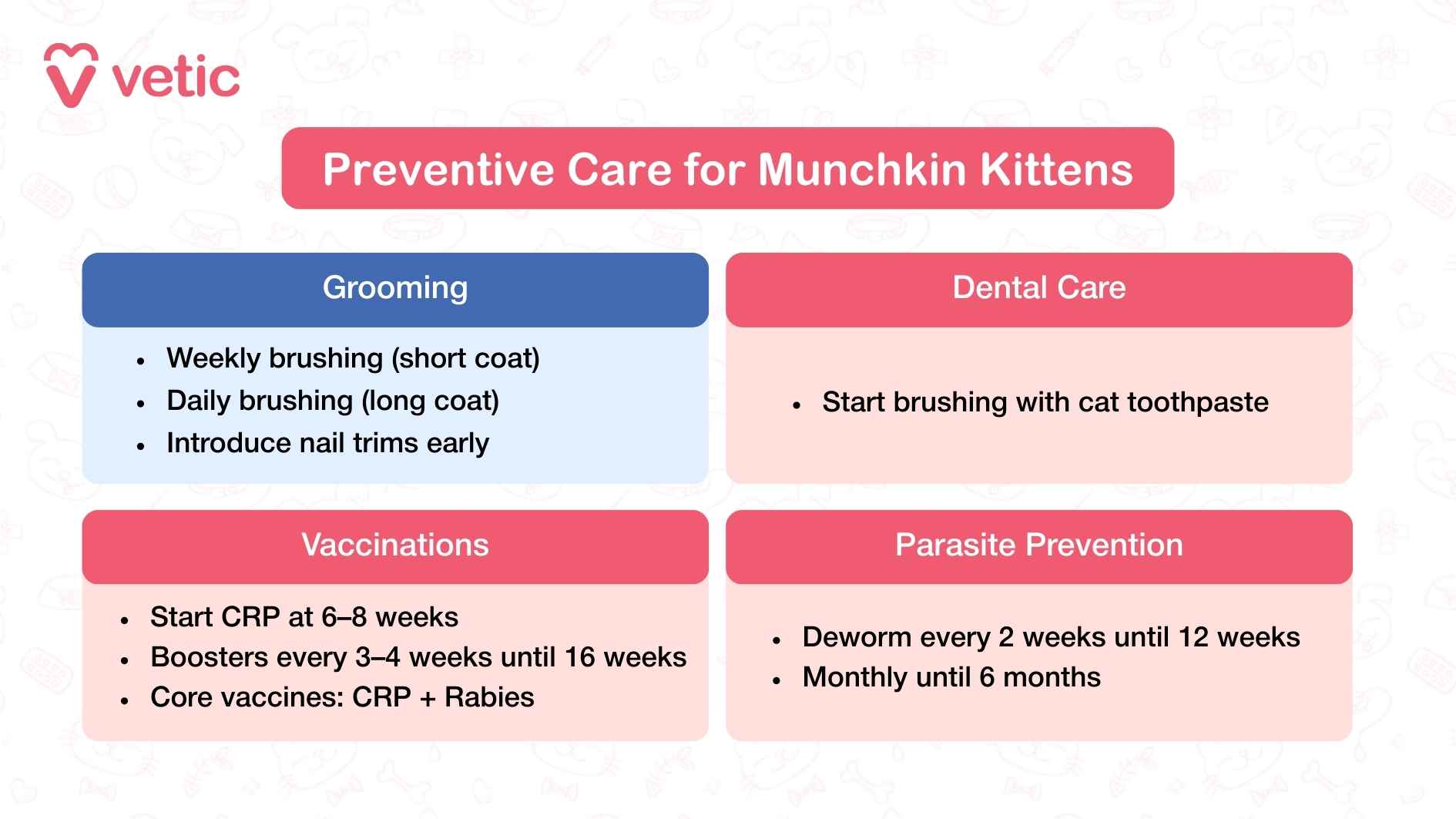
Vaccinations for Munchkin Kittens
Begin core vaccines at 6–8 weeks with boosters every 3–4 weeks until 16 weeks. Core vaccines include CRP (feline viral rhinotracheitis, calicivirus, panleukopenia) and rabies.
Parasite Prevention for Munchkin Kittens
Kittens should be dewormed every 2 weeks until 12 weeks, then monthly until 6 months. Use flea preventives suitable for their weight. Heartworm prevention may be needed in mosquito-prone regions.
Grooming for Munchkin Cats
Munchkin kittens have soft coats and delicate skin. Short-haired kittens need weekly brushing, while long-haired ones should be brushed daily to prevent mats. Introduce nail trimming and ear cleaning early so they get used to handling.
Dental Care
Start brushing gently with a kitten toothbrush and vet-approved toothpaste. Early exposure makes dental hygiene easier in adulthood and prevents plaque buildup on tiny, developing teeth.
Spaying and Neutering of Munchkin Cats
Most vets recommend spaying or neutering Munchkin kittens between 5–9 months of age, before sexual maturity. This elective surgery prevents unwanted litters and reduces the risk of uterine infections, ovarian cancer, and testicular cancer. It also curbs spraying and roaming behaviors as they grow.
Vaccines, Deworming & Grooming for Munchkin Cat Adolescents (1–2 Years)
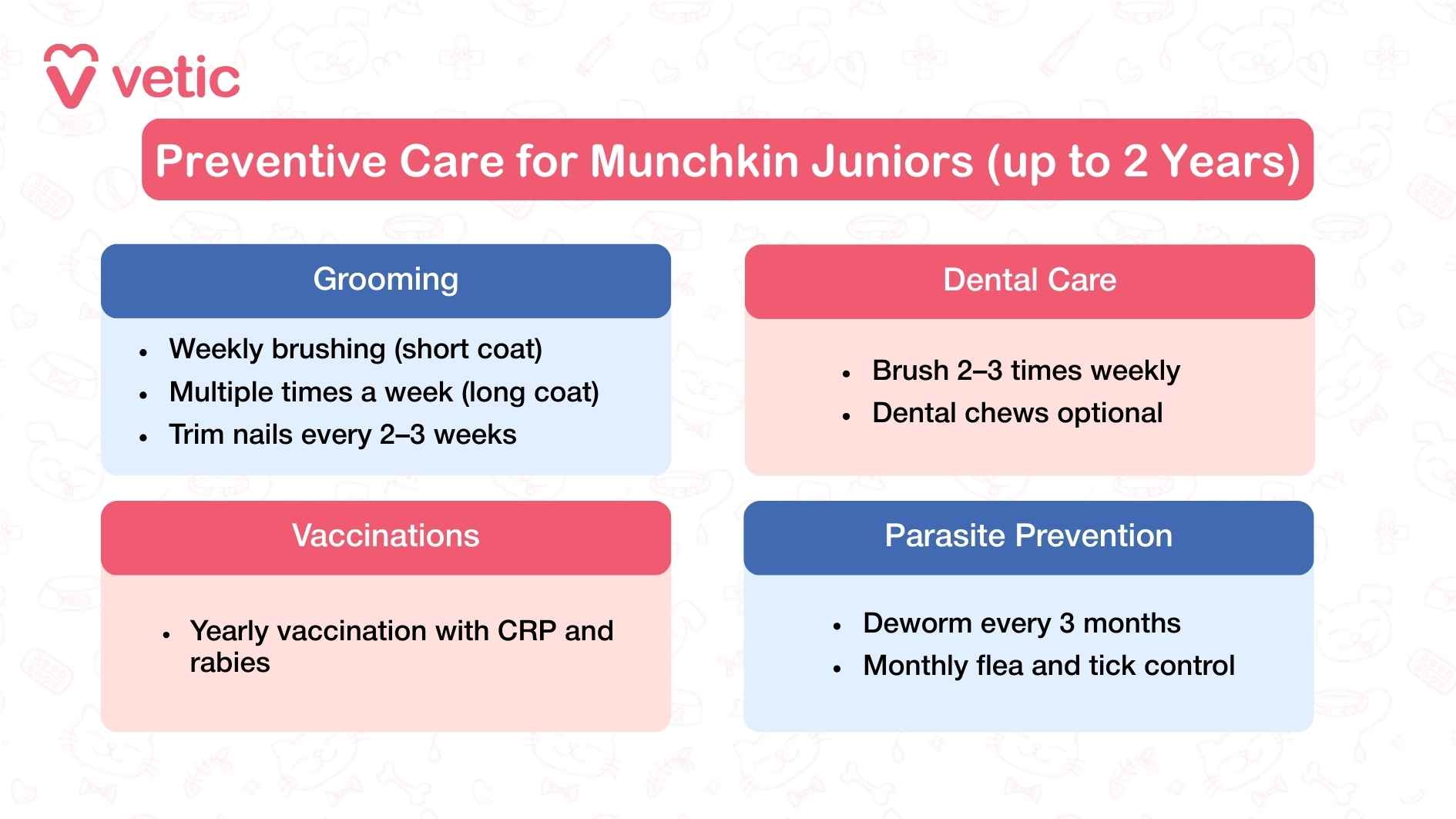
Vaccinations for Junior Munchkins
Annual boosters for CRP and rabies are essential.
Parasite Prevention for Junior Munchkins
Deworming should continue every 3 months. Monthly flea and tick preventives protect against skin irritation and vector-borne diseases. Indoor cats benefit too, since parasites often enter homes via humans or other pets.
Grooming for Munchkin Cats
By this stage, regular grooming should be a habit. Brush short-haired cats weekly and long-haired cats several times a week. Trim nails every 2–3 weeks and check ears monthly. Bathing is rarely required unless your cat gets dirty.
Dental Care
Permanent teeth have settled in, making plaque buildup more common. Brush 2–3 times a week, and use dental chews or water additives as recommended by your vet.
Spaying and Neutering of Munchkin Cats Juniors
If not done in kittenhood, spaying or neutering should be completed in this stage to prevent reproductive diseases and reduce hormone-driven behaviors like yowling or spraying.
Vaccination, Deworming & Grooming for Munchkin Cats Adults (4–8 Years)
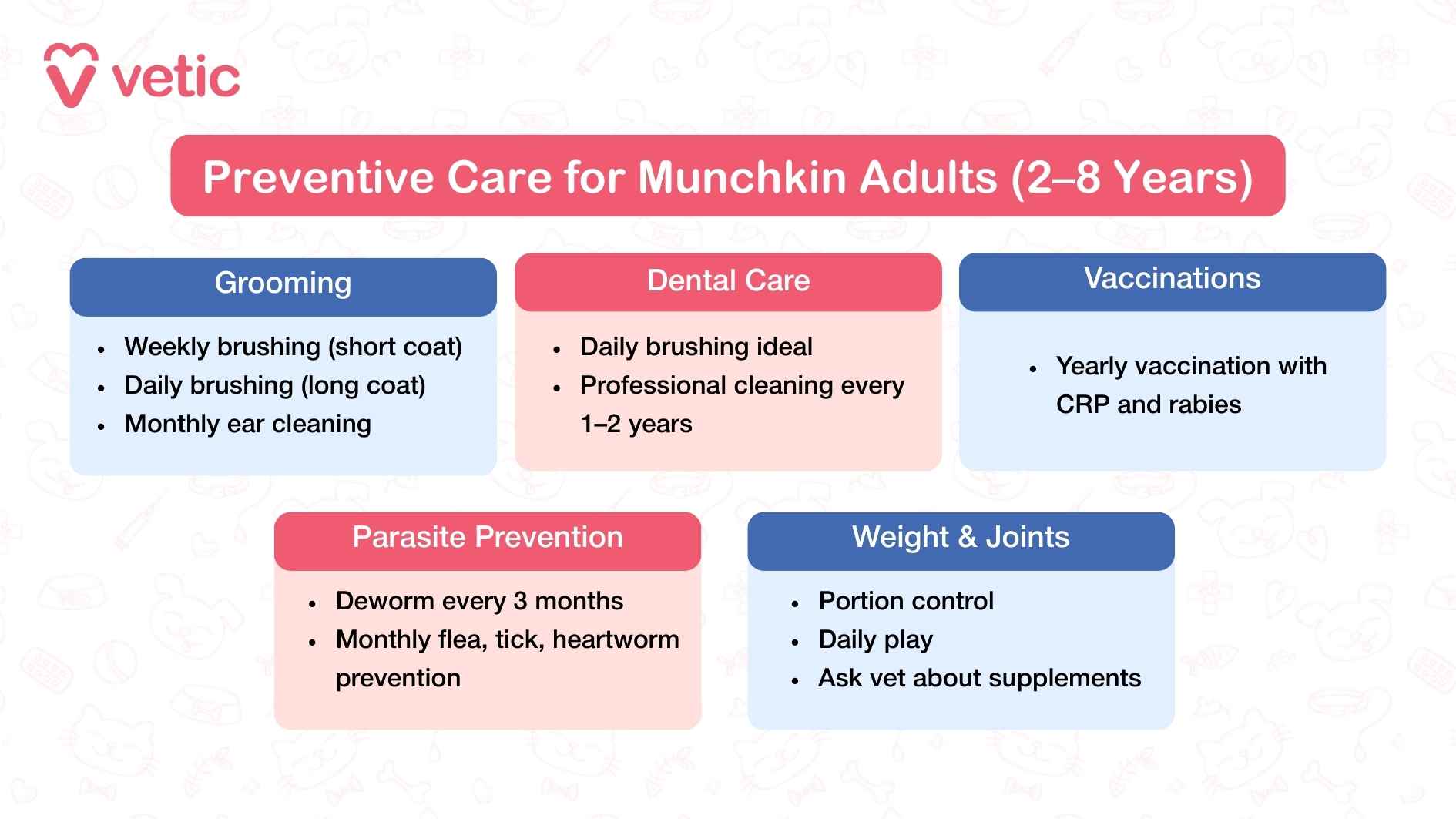
Vaccinations for Munchkin Cats
Rabies and CRP boosters remain essential. Frequency (annual vs. every 3 years) depends on the vaccine type and your vet’s guidance. Additional vaccines may be advised based on exposure risks.
Parasite Prevention
Continue deworming every 3 months and monthly preventives for fleas, ticks, and heartworm. Munchkins with sensitive skin may require vet-approved, gentle products.
Grooming of Munchkin Cats
Adult Munchkins shed moderately year-round. Weekly brushing for short-haired cats and daily brushing for long-haired cats reduces shedding and prevents tangles. Regular nail trimming prevents posture issues. Ear cleaning once a month and occasional baths (only if needed) keep them comfortable.
Dental Care for Munchkins
Dental disease is common in adult cats. Daily brushing is ideal, and professional cleanings may be required every year or two. Poor dental hygiene can lead to gum disease, tooth loss, and even organ damage.
Weight and Joint Monitoring in Munchkin Cats
Obesity is a key concern for adult Munchkins. Excess weight strains their short legs and spine. Feed portion-controlled meals, encourage daily play, and ask your vet about joint supplements like glucosamine.
Spaying and Neutering
If not already done, spaying or neutering remains important even in adulthood. It lowers cancer risks and helps stabilize behavior. Cats fixed later in life may still benefit from reduced aggression and marking.
Vaccine, Deworming, Grooming for Munchkin Cat Seniors (8+ Years)
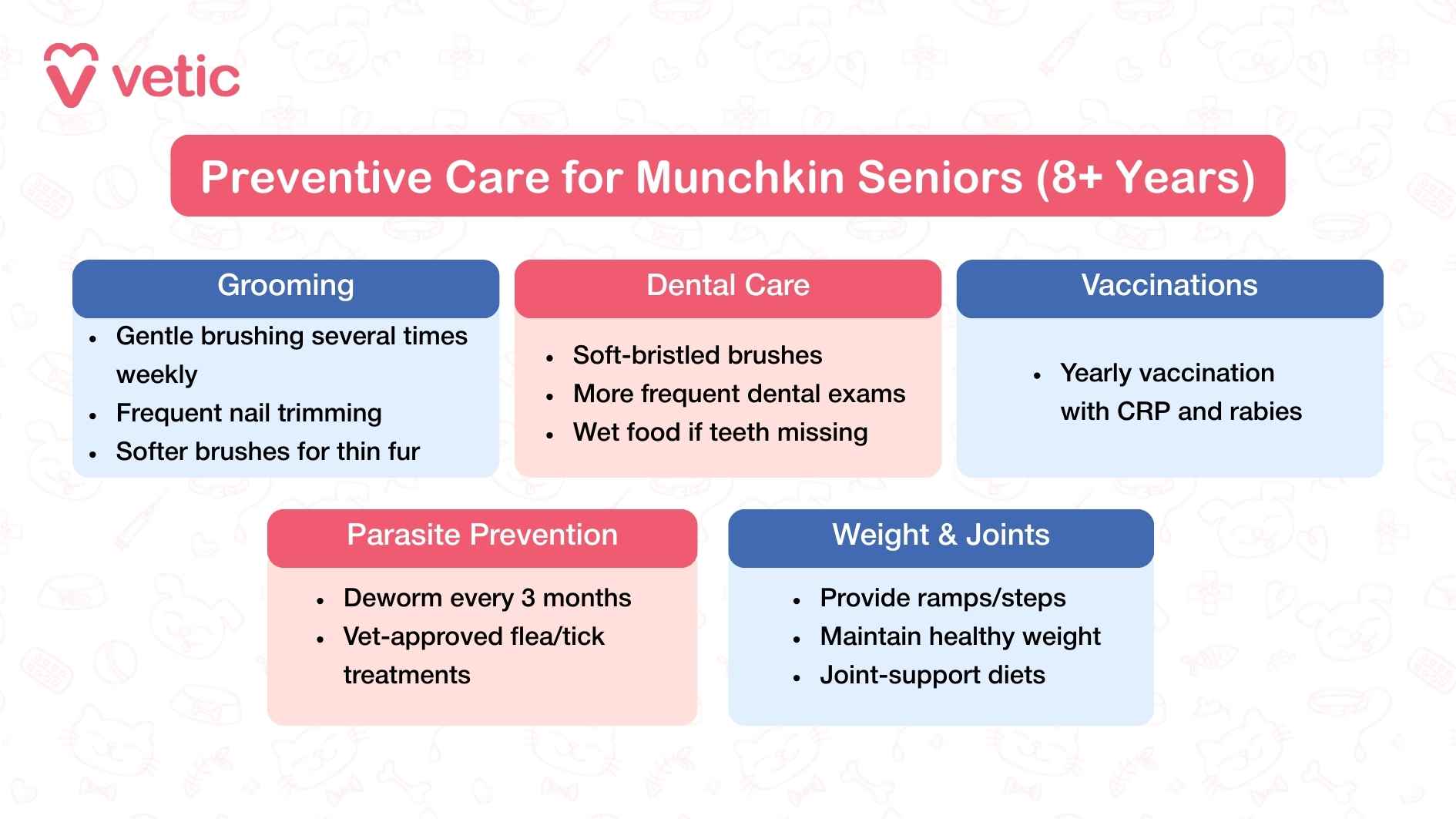
Vaccination for Munchkin Cats
Senior cats still require core vaccine boosters, though your vet may adjust the schedule based on health. Rabies remains mandatory in most regions.
Parasite Prevention
Deworming every 3 months and flea/tick preventives remain essential. Seniors may have more sensitive skin, so only use treatments recommended by your veterinarian.
Grooming for Munchkin Cats
Senior Munchkins may develop thinner coats and more sensitive skin. Gentle brushing several times a week stimulates circulation and reduces mats. Keep nails trimmed, as older cats are less active and nails can overgrow quickly.
Dental Care
Tooth loss and gum disease are common in seniors. Continue brushing if tolerated, use soft-bristled brushes, and schedule professional dental exams more frequently. Wet food may help cats with missing or painful teeth.
Joint and Mobility Care for Munchkin Seniors
Age makes mobility issues more likely in Munchkins. Provide ramps or step-stools for furniture access, maintain a healthy weight, and use joint-support diets or supplements as advised by your vet.
Takeaway on Vaccinations, Deworming & Grooming for Munchkin Cats
Preventive care for Munchkin cats is not just about avoiding illness, it’s about giving them the healthiest and happiest life possible. Their short legs and long backs make weight management, joint health, and regular vet monitoring especially important. From brushing their coats and cleaning their teeth, to keeping parasite control up to date, scheduling spay or neuter surgery, and ensuring proper nutrition, every step you take adds to their well-being.
Prevention is always easier and kinder than treatment. With consistent grooming, dental care, annual vet visits, vaccinations, parasite control, and spay or neuter surgery, your Munchkin can enjoy a long, joyful life filled with play, cuddles, and their trademark quirky charm.
FAQs on Grooming, Vaccinations, Parasite Control, and Surgery for Munchkins
1. When should I start grooming my Munchkin kitten?
Begin brushing early. Weekly for short-haired, daily for long-haired kittens. Introduce nail trimming and ear cleaning gently to build tolerance and prevent stress in adulthood.
2. How often should adolescent Munchkin Cats be vaccinated?
Juniors need annual boosters for rabies and CRP. Boosters may be recommended if your cat goes outdoors or meets other pets.
3. Why is dental cleaning so important for Munchkins?
Like all cats, Munchkins are prone to plaque and gum disease. Regular brushing and professional dental exams prevent painful oral issues and protect overall health.
4. What parasite prevention do adult Munchkin cats need?
Deworm every three months and use monthly flea, tick, and heartworm preventives. Even indoor cats benefit, since parasites can enter homes on shoes, clothes, or other pets.
5. How do I monitor my Munchkin cat’s weight?
Check their body condition monthly — you should feel ribs without pressing hard. Control portions, avoid free-feeding, and encourage daily play to prevent obesity.
6. What special care do senior Munchkins require?
Gentle brushing, frequent nail trims, joint-friendly diets, and ramps for easier access. Seniors also need more frequent dental care, parasite control, and veterinary checkups.
7. Can senior Munchkins still receive vaccines?
Yes. Core vaccines remain important, though your vet may adjust schedules depending on overall health. Rabies is mandatory in most regions regardless of age.
8. When is the best time to spay or neuter a Munchkin cat?
Most vets recommend spaying or neutering within 1 year of age. Early surgery prevents reproductive diseases, reduces spraying and roaming, and supports long-term health.

